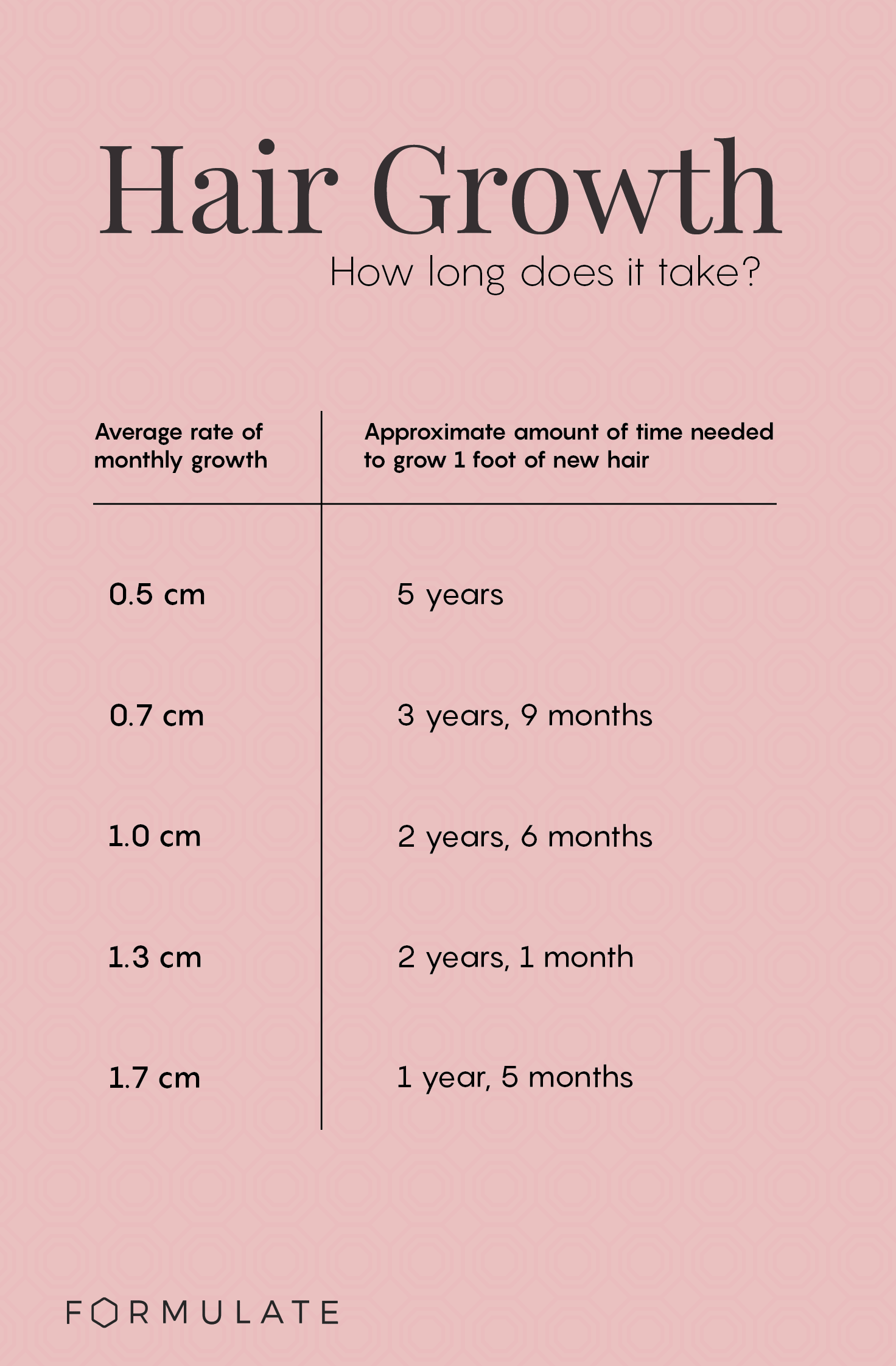Let's face it-- unexpected hair loss is tough.
We've all experienced it in one way or another. Maybe a new stylist chopped off quite a bit more hair than you expected at the salon. Or maybe you bleached your hair just a few times too many, and now face mass breakage.
After we grieve (because let's not sugar coat it, we've all cried over our hair at least once), we're forced to wait.
And wait.
And wait.
Waiting for hair to grow is tough stuff -- so how long will it take until your hair is the same length it was before?
According to The Trichology Society, hair growth occurs on average at a rate of between 0.5cm - 1.7cm per month. If that seems like a big difference in average rates, it is. According to this scale, some people grow hair three times as fast as others do. Unfair, right?

The variety of hair growth rates occurs because of a lot of different factors. Race has been connected to growth rate, as has age, diet, hormonal fluctuations, and even season. Yes, that's right-- hair growth may slow during the winter and increase during the summer. A 2009 study found that over the course of 6 years, a population of 823 healthy female participants experienced overall higher summer growth and lower winter growth. Why this is, we still don't know (more on that later.)
Predicting hair growth is harder than you thought.
There's so much diversity in hair growth rates that it's nearly impossible to reliably predict how quickly your own hair will grow. For example, we know that as people age, their hair growth decreases, that crash diets can disrupt hair growth, and that hormonal changes can alter hair growth; puberty changes hair growth, as does pregnancy. So even if a person measures exactly how much their hair grew over several months, their hair may not grow at that same rate during the following few months, nevertheless the next several years. That person might have a baby, take a medication that alters their hormones, drastically change their diet, or do something else that alters the way that their hair grows that scientists haven't learned about yet. People are dynamic and constantly moving and changing; hair growth is dynamic as well.
Hair growth isn't well understood
It's also important to note that, surprisingly enough, scientists don't know that much about the way hair grows. Sure, we've got the basics down pat -- hair growth has four phases: growth (anagen), regression (catagen), resting (telogen) and shedding (exogen). Specific questions as to how we can manipulate the hair growth cycle, however, remain elusive. Minoxidil and Finasteride are the only two drugs that have been approved by the US Food and Drug Administration (FDA) to treat hair loss, and both were discovered serendipitously (AKA by accident). Minoxidil was originally developed to treat hypertension, and Finasteride was developed to treat prostate disease. Both drugs produced hair growth as a side effect of use, which ultimately became of greater interest to developers.
And let's address the elephant in the room; a lot of consumers believe that taking supplements can help make their hair grow faster and thicker. Despite the sheer number of hair supplements on supermarket shelves, there's little evidence to prove their effectiveness. Studies have shown that in individuals who are already healthy, adding extra vitamins does very little to affect hair growth. On the flipside, vitamins may be helpful for someone who experiences stunted hair growth because of malnourishment, but actually solving the problem of malnutrition in that individual would do them a lot more good. Why put a band-aid on a problem when you could actually fix it instead, right?
Is there a way to make hair grow faster?
There is one way to make your hair feel like it's growing faster, though it won't actually affect the way that your follicles produce hair. This strategy isn't glamorous or quick, but it is pretty darn effective.
It's simple: take better care of the hair you've still got.
Not the answer that you expected? Let's talk about it. Even if your hair grows more rapidly than most peoples (like if you grow a whopping 1.7 cm a month), it's still pretty darn slow. At a rate of 1.7 cm a month, growing a foot of hair will take roughly a year and a half. And if you're less lucky and are on the other end of the hair-growth spectrum, be prepared to wait a whole lot longer. If your hair grows at a rate of 0.5cm a month, it will take approximately five years to gain a foot of hair -- yeouch.
Here's the real kicker -- these estimates on how quickly hair grows apply only to the rate of growth, not how well hair is retained. You might be growing hair at a rate of, say, 1 cm a month, but how is that hair holding up over time? We tend to put our hair through a whole lot of abuse, including heat damage, water damage, and chemical damage. Hair is strong, but it isn't magical -- like any other natural fiber, it reaches a breaking point. Regardless of how quickly your hair grows, it will take far longer to achieve your ideal length if excess breakage occurs.
So how can you take better care of the hair you've already grown? For starters, you can limit heat styling, stop relaxing/perming your hair, and ditch high-maintenance hair colors that require frequent touch-ups. If you really must dye your hair, choose a shade close to your natural color that only has to be touched up once every few months (side benefit: you'll also save a ton of money at the salon).
To go a step further, you can also wash your hair less often, which provides the double-benefit of limiting water exposure and exposure to harsh cleansers like sulfates that can damage hair. And if you really want to be a damage-prevention all-star, do all of the above, plus limit the amount of hair styling, period. This means no fancy, tight hairstyles, and absolutely no brushing wet hair.
Like we said, this strategy for hair growth isn't glamorous or buzzy, but it's science-based and highly effective. Keep growing, and keep glowing, y'all.
Wanna learn more about what hair science can do for you? This is what we recommend reading next:
Relaxed Hair Care
The secrets to the healthy relaxed hair of your dreams 🤩
Is Hair Alive?
The answer might be a little more complicated than you thought 👀
How Often Should You Condition Your Hair?
Pro tip: Never EVER skip conditioner, unless you really want to damage your hair.
What You Need to Know About Transitioning to Sulfate-Free Shampoo
Consider this your ultimate guide to the sulfate-free journey ✅



